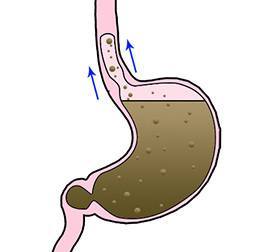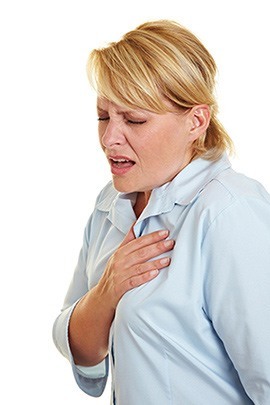Gastric Reflux Condition
Description

Gastric reflux, also called gastro-oesophageal reflux disease (GORD), is a condition where the stomach's contents rise up from the stomach into the oesophagus. Food mixed with the stomach's digestive acids can irritate and damage the oesophagus.
Causes
Normally, the stomach contents are retained in the stomach with the help of the lower oesophageal sphincter (LOS), a muscle that contracts and relaxes to maintain the one way movement of food. However, gastric reflux occurs when the LOS weakens. The exact cause of this is not known, however certain factors including obesity, smoking, pregnancy and possibly alcohol, may contribute to GORD. Common foods such as alcohol, spicy foods, onions, chocolates, caffeine containing drinks, mints, tomato-based foods, citrus fruits and certain medications can worsen gastric reflux.
Impact
Living with gastric reflux is inconvenient as symptoms can severely interfere with your life. You may have to follow certain dietary restrictions and reflux occurring in the night can hinder a good nights sleep, thereby affecting alertness and productivity the next day.
Symptoms

Heartburn is usually the main symptom of GORD, characterised by a burning-type pain in the lower part of the mid-chest, behind the breast bone. Other symptoms include a bitter or sour taste in the mouth, trouble swallowing, nausea, dry cough or wheezing, regurgitation of food, hoarseness or change in voice and chest pain.
Diagnosis
Your doctor may order some of the following tests to diagnose gastric reflux:
- Endoscopy: allows the doctor to examine the inside of your oesophagus, stomach and portions of the intestine with an instrument called an endoscope, a thin flexible telescope
- Twenty four-hour pH monitoring: involves inserting a tube through your nose into the oesophagus, and positioning it above the LOS. The tip of the tube contains a sensor which can measure the pH of the acid content refluxed into the oesophagus. The tube will be left in place for 24 hours.
- BRAVO capsule: This is an alternative way to measure acid exposure in the oesophagus. A small wireless capsule is introduced into the oesophagus using a gastroscope. The pH sensor transmits signals to a computer which collects the data about the acid exposure over the next24 hours. The capsule eventually falls off of the oesophagus lining and is safely passed in the stool.

- Oesophageal Manometry. A tube placed into the oesophagus measures how well the muscles of the oesophagus work which is helpful in assessing the problem
Treatments
Treatment is aimed at reducing reflux, relieving symptoms and preventing damage to the oesophagus. Some of the treatment options include:
- Antacids: over-the-counter medicines that provide temporary relief to heartburn and indigestion by neutralizing acid in the stomach
- Other medications: PPI drugs reduce the production of acid in the stomach
- Fundoplication: is a key-hole surgical procedure in which the upper part of the stomach is wrapped around the lower end of your oesophagus where it is sutured into place. This surgery strengthens the sphincter and helps prevent stomach acid and food from flowing back into the oesophagus.
Prognosis
The outcome of treatment varies from person to person. Some may experience mild symptoms while for others, treatment can be very successful. Most people respond well to lifestyle changes and medications. However, a relapse is very common after cessation of medications, so the condition does require maintenance. When medications fail to resolve symptoms or it is your preference not to take medication, surgery is recommended.
Untreated
If left untreated, chronic GORD can cause serious complications such as inflammation of the oesophagus, oesophageal ulcers, narrowing of the oesophagus, chronic cough and reflux of liquid into the lungs (pulmonary aspiration). Some people may develop Barrett's oesophagus, a condition characterised by changes in the oesophageal lining, which that can lead to oesophageal cancer.





